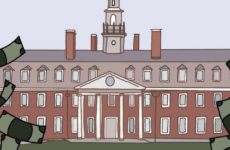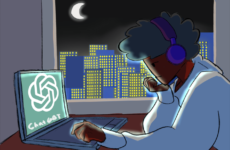Choate is generally an accepting community, especially towards queer students. I have never felt discriminated against by a student, although I have been asked some ignorant, albeit innocent, questions. The only time I have ever felt targeted for my sexuality was by faculty members regarding the new visitation policy.
Often, particularly with older generations, people don’t realize how their actions can be offensive or discriminatory towards a group of people. I do not believe that the administrators who created this new policy intended to make queer students feel uncomfortable or unsafe at Choate; however, I do not think they have fully considered the effect that such a policy will inevitably have on students that do not fit the heteronormative and cis-normative standards so deeply ingrained within people’s minds.
My main issue with the new visitation policy is that it forces queer students to come out to others and to define their sexuality. Within a week of my return to school this year, two different advisers in my dorm, neither of whom I had spoken to extensively, decided it was appropriate to confront me about my sexuality.
A common misconception among faculty at Choate is that just because a student is not hiding their sexuality, they are automatically comfortable talking about it with anyone and everyone. The best way for advisers to address sexuality is just to wait until their advisees bring it up with them. If they choose not to, it is probably because they feel uncomfortable discussing their sexuality with their adviser, and their adviser needs to respect students’ levels of comfort.
Asking about a student’s sexuality forces the student to adopt a label, which is something that they may not feel comfortable doing, now or ever. Sexuality is fluid and susceptible to change, so one label may not fit a person all the time, and that’s okay. Imposing a label on someone forces that person into an identity that they may not be comfortable with.
I do not have first hand experience with the discrimination and oppression felt by the transgender and non-binary community, but it seems to me that basing the visitation policy on gender instead of sex is a step in the right direction, if only because it acknowledges that gender and sex are not the same thing. However, it also forces trans students to come out to everybody, not just their advisers.
Since Choate, and the world in general, is far less accepting of trans people than of queer people, this could be more problematic than it is for queer students. Additionally, this policy assumes that students are either trans or cis and excludes the entire genderfluid and agender communities.
I have heard different interpretations of the new visitation policy from every faculty member I have spoken to about it, but one thing that they all agreed on was that the policy is based on the integrity of the students. Framing it in this way is problematic, in that it suggests that if a student does not feel comfortable coming out to their adviser, they are compromising their integrity.
I understand that the school needs to have a coed policy for liability reasons but I do not see why it is necessary for same-sex couples. Having a coed policy, in large part, was able to prevent pregnancy, which is a concern the school does not have for same-sex couples. Although the previous coed rule and our current visitation policy both aim to prevent intimacy, they simply add to the stigmatization of adolescent sexuality that already pervades society. We need to dismantle the idea that teenage sexual exploration is something that should be prevented, and instead implement sex education programs that teach students about healthy relationships, safe sex, and consent.
Choate’s new visitation policy, although a good effort, ultimately fails to be as inclusive as it aims to. Recognizing transgender students is definitely an improvement, but a lot of work still needs to be done to include the non-binary community in school policies. Requiring same-sex couples to get visitation only creates an uncomfortable environment for queer students in the dorm and demonizes sex instead of teaching students about safe practices.




